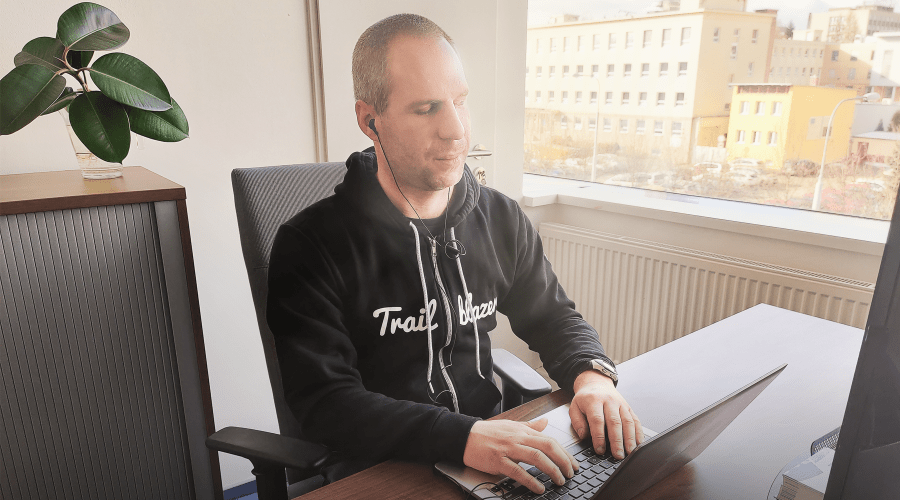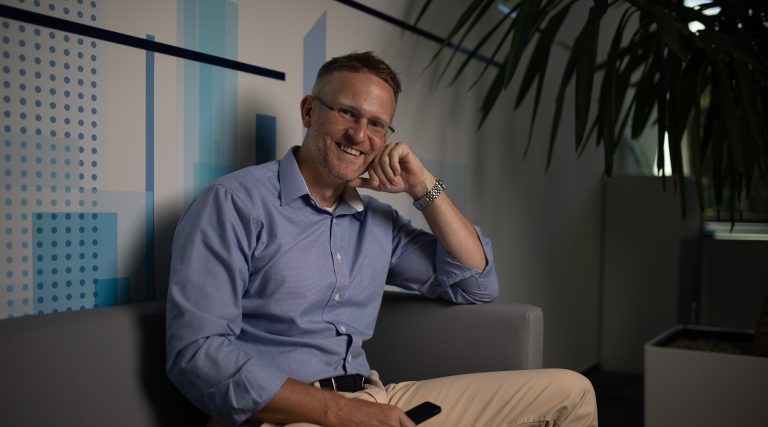Blind Recruiter Petr Adamec: ‘I am not Superman; I listen to people.’
He started in a recruitment agency as a CV database administrator and later became a recruiter. The fact that his four-legged partner Amigo accompanies him during interviews does not prevent him from anything; on the contrary. Recruiter Petr Adamec explains why he does not inform the interviewees about his handicap in advance and offers an insight into his recruitment of new colleagues.

Peter, you have been working in Master as a recruiter for almost two years, how did you take up with HR?
Actually, to HR and recruitment I got by chance; having graduated at university, I have shortly been working as a translator from English. Later, at the Guide Dogs Training School, one of my friends and future colleague suggested me trying quite non-typical position for the blind– job in a recruitment agency. First, I was dealing with contact database, sorting CVs into categories etc. – conventional paperwork. Gradually I shifted from CVs to live candidates – first via phone, later face-to-face.
How was the work in the agency different from Master?
It absolutely seemed more dynamic and aimed at performance. On the other hand I saw it as quite impersonal. I lost the track of the candidate at the moment of their placement with the client. I could not observe how he gets along in the position we found for him. I missed this, some consequent contact with the candidate, to know whether he is happy, to see how he develops and grows. Plus in a way the work was quite a routine, which is not possible in Master.
How has recruitment changed with the Covid-19 pandemic?
Like almost everything, interviews take place online. Which – truthfully – speeds things up. But I must admit it does appeal too much to me. Perhaps I cannot describe it verbally quite right, but I miss something, maybe the energy from the personal meeting. Yes, energy, that is the right word.
I absolutely understand, same with me…
I am not saying I am kinda psychologist, not at all. I approach interviews with humbleness. But I am certainly not Superman. I always try to listen to people, to understand what they want. Which is far better to do face-to-face. Webcam and mic do not transfer some part of information, the energy perhaps.
Petr Adamec
In Master, he has been working as a recruiter. He addresses himself a “naturalised Brno-citizen” having roots is Slovakian Bratislava. As a recruiter and HR employee started in a recruitment agency in which he gained plentiful experience. He studied history and English language and literature. He prefers to spend his free time with his four-legged friend Amigo; he walks the dog in the countryside, unwinding of the everyday worries. He used to do sports activities, such as tandem biking and skiing. He enjoys reading, listening to audiobooks, and following what is happening in the world.
Are there any principles you keep up to during the interviews, maybe some favourite questions?
You mean like what you will be doing in ten years, or draw a tree? No, not at all (laughing). I try to avoid that. I attempt to lead the interview in a more friendly way, so that the candidate can see that in Master they are not interrogated.
And what if it all does not come out? If you, during the interview, discover that it is not the right choice?
Then I honour a fundamental principle – to always give the interviewee a feedback. I don’t like the sloppy phrases like ‘We will let you know’. I am really careful about this, I always get in touch and explain what was wrong and why.
I cannot miss the fact that you are blind. Nonetheless, you handle your job easily despite the visual impairment, and interview the candidates with your loyal dog-friend Amigo. How do the candidates react to this? Do you inform them beforehand?
No, I don’t. I do not consider it important. Some of them might recognise me from the photo, but most of them do not know about this before the actual meeting. But they usually seem fine. Plus Amigo usually works as a sort of icebreaker, since he welcomes everyone enthusiastically.
Is it of any help that during the whole recruitment you are free from visual perception?
Actually, I have never thought about it. Perhaps I do not perceive it any more. When working with candidates, I try to concentrate on their knowledge. I primarily deal with the fact whether the candidate is beneficial for Master and whether or not we do offer a satisfying position to him. I obviously do not stereotype; I do not judge candidates based on their appearance, that is a fact. But to be honest, I have not been considering this so far.
And how about the working tools, which you, as a recruiter, use? How do you work with them without seeing them?
First of all I must say that the tools I use are not modified anyhow. Their accessibility is miscellaneous. One must try, fight and not give up. And it works in the end. For instance a recruitment LinkedIn extension is paradoxically far more accessible than the LinkedIn itself.
I must pinpoint you are no the only Master employee with a visual impairment. We have supported the blind and enlightened the public in web accessibility field in the long run. Has it been for you, personally, somehow important?
It certainly has. That is why I like Master so much and what has the utmost importance for me when changing the position. I had noticed before that Master cooperated with Světluška (Czech Radio endowment funding for the visual impaired, translator’s note), and that a blind programmer Roman Kabelka works there on web accessibility analyses and testing. I found it appealing and though ‘Yep, this is where I would like to work’. When I was applying for a job elsewhere, I often struggled with presumptions that the blind cannot work as a recruiter. I even did not get a response from some of the companies. Maybe they were afraid, can’t say. In Master we are far beyond that, the people here are used to the blind colleagues, nobody is concerned with what we could not do something. Which is the factor that played the most for me.
Who is Peter looking for right now?
We have been looking for new Masters constantly, both for the MasterAPP department and MasterDC. Watch our career web whether you could be the part of our team.
What works for today’s candidates?
That we are not a corporate, but a smaller Czech company. They like the success we have achieved. In general I get positive feedback on our external presentation. And it also works when we offer some marketing positions (laughing). There are always more candidates than positions which confirms that everyone would like to work in marketing. Unfortunately only a few really know what is going on in there.
Who are you currently looking for?
Perhaps we would most need a Linux administrator, who would help the admins. The guys have a load of work on interesting projects for big customers such as Rohlik.cz, Ušetřeno and others. More help, particularly in Prague, would come in handy, so that they could work on the pile of commissions. Concerning the commissions, we have been also looking for a new SalesRep., for the business is something we want to focus more on.
Considering the open recruitments, how do they take place and what exactly do you do?
Having made clear with the team manager who we look for, we compile a profile, publish the advertisement and I start to address the candidates actively on LinkedIn. Then I make a screening call in which I introduce the Master and with candidates I discuss their ideas straight away. Having gone through this, the candidate participates in the first, possibly the second round with the manager. In some teams it works better if the candidates encounters the potential team members and the manager during the recruitment process already. In the end, if everything goes well, the offer is made. So it is the applicant who makes the final decision. If they are flexible, they might start their work the very next day. We already have this experience (laughing).
Would you have any good advice for the applicants? I do not mean the ones who are applying for the Master position, but generally. Whether they are looking for the job which they lost or they are thinking about a change.
Be honest. Do not play a tune, speak the truth and do not be ashamed of what you know and what you want. Do not underestimate yourself, but at the same time do not overestimate your skills. Because if you hold back some information during the recruitment process, it will get back to you like a boomerang. Either you or the employer will be dissatisfied.



